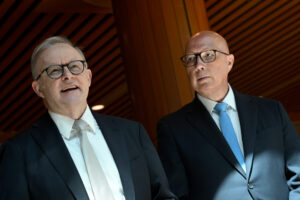Machiavelli would have known what to do about PwC

Today, the name of Niccolò Machiavelli is a byword for cynicism and hunger for power, but there was one profession so parasitic and selfish even he could not stomach it.
To hear Machiavelli tell it, 16th century Italy was plagued by expensive, flashy contractors who bled the public, failed to deliver what they promised and then turned around and robbed the ones who paid them.
Those faults will ring a bell for those who have followed the consulting firm scandals exposed over the past year, including misusing government secrets and taking money for buried reports. With the inquiry into the NSW Government’s use and management of consulting services releasing its damning findings earlier this week, and the Senate inquiry into consulting service integrity due any day now, fresh light has been cast on the behaviour of these large, well-paid government contractors – and the picture is no prettier than it was in Machiavelli’s day.
Of course, by contractors Machiavelli meant the mercenary captains whose private armies did most of the city-states’ fighting, but the word, condottieri, literally means contractors, and the parallels are remarkable.
Like the mercenaries, today’s consultants favour style over substance. Academics Mariana Mazzucato and Rosie Collington call this “the Big Con”: the undeserved confidence of consultants tricks clients, journalists, politicians and the public into placing more trust in their words than they deserve. The Renaissance equivalent was for mercenary companies to fight flashy but ineffectual battles. A colourful, if apocryphal, tale has it that at the 1440 Battle of Anghiari mercenary companies fought round the clock with only one death: when a soldier fell off his horse.
Consultants also have a perverse incentive to help only a little. If you solve your client’s problems, they are unlikely to extend your contract. Machiavelli describes the hesitant way condottieri did battle, refusing to fight at night, conduct winter campaigns or fortify their encampments.
Like consultants today, Italy’s mercenaries had divided loyalties. Some contracts lasted mere months, so it would not do to alienate an enemy city-state – a potential future customer. Today, when consultants advise government, there is always the risk that their thinking is coloured by what may benefit their private clients.
Nor is an international firm going have the local expertise and institutional knowledge of the public service. Machiavelli likens the use of foreign auxiliaries to wearing armour made for someone else: it will always be too wide or too narrow.
Having invited a private army into your lands, it may prove difficult to dislodge. Some mercenary companies turned to banditry to maintain their incomes, or used their position of power to conquer their former employer. The Albanese Government may be experiencing something similar. Despite rolling scandals from consulting firms, new contracts are being signed. Years of revolving door hiring means former senior public servants are now embedded in the consulting firms, and consulting firm alumni are in senior positions in the public service. And rumour has it that consulting firms wrote procurement rules that determine when consulting firms are used.
Machiavelli had a ready solution to the problem of self-interested mercenaries and auxiliaries of divided loyalties: the nation should raise and organise a national army. The solution to the problem of consulting firms doing core government is much the same: we should replace them with a well-resourced and reinvigorated public service, to serve as a standing army of experts giving frank and fearless advice to government, answering the questions of the Parliament with candour and remembering always the public they are supposed to serve.

To do this requires rules limiting the circumstances under which consulting firms can be used, making the advice of consultants public so it can be scrutinised and stopping the revolving door between the public service and consulting firms. But it also requires cultural change: for parliamentarians and ministers to speak of the public service with respect, not disdain; and for public servants to act in a way that warrants that respect. Too many public servants have contorted their advice to fit what their minister wants to hear.
There must also be consequences for wrongdoers. Consulting firms that betray the public trust should be banned from receiving future government work or confidential government information. Their existing work should be reviewed to confirm it is of the quality and integrity promised.
Italy turned to mercenaries because its relatively small population made it harder to rely on the classic civilian levy used by its larger rivals. They paid for external labour. The Coalition Government’s cap on public service numbers was a self-imposed version of this limitation: when more work was needed, they refused to hire for it – leaving themselves at the mercy of consultants and contractors.
Machiavelli was heartbroken that his beloved Italy was in the hands of self-interested and profit-focused mercenaries, but he had a solution: a national army. These days, we take it for granted that citizen soldiers are more effective, loyal and motivated combatants than mercenaries. And although the work of a public servant is very different, the same logic holds. We should mobilise a well-resourced and trusted public service to serve the country.
Between the Lines Newsletter
The biggest stories and the best analysis from the team at the Australia Institute, delivered to your inbox every fortnight.
You might also like
5 ways and 63 billion reasons to improve Australia’s tax system
With a federal election just around the corner, new analysis from The Australia Institute reveals 63 billion reasons why our next Parliament should improve the nation’s tax system.
Business groups want the government to overhaul the tax system? Excellent – we have some ideas.
The landslide win by the ALP has seen business groups come out demanding the government listen to their demands despite having provided them no support, and plenty of opposition, over the past 3 years.
10 reasons why Australia does not need company tax cuts
1/ Giving business billions of dollars in tax cuts means starving schools, hospitals and other services. Giving business billions of dollars in tax cuts means billions of dollars less for services like schools and hospitals. If Australia cut company tax from 30% to 25% this would give business about $20 billion in its first year,

